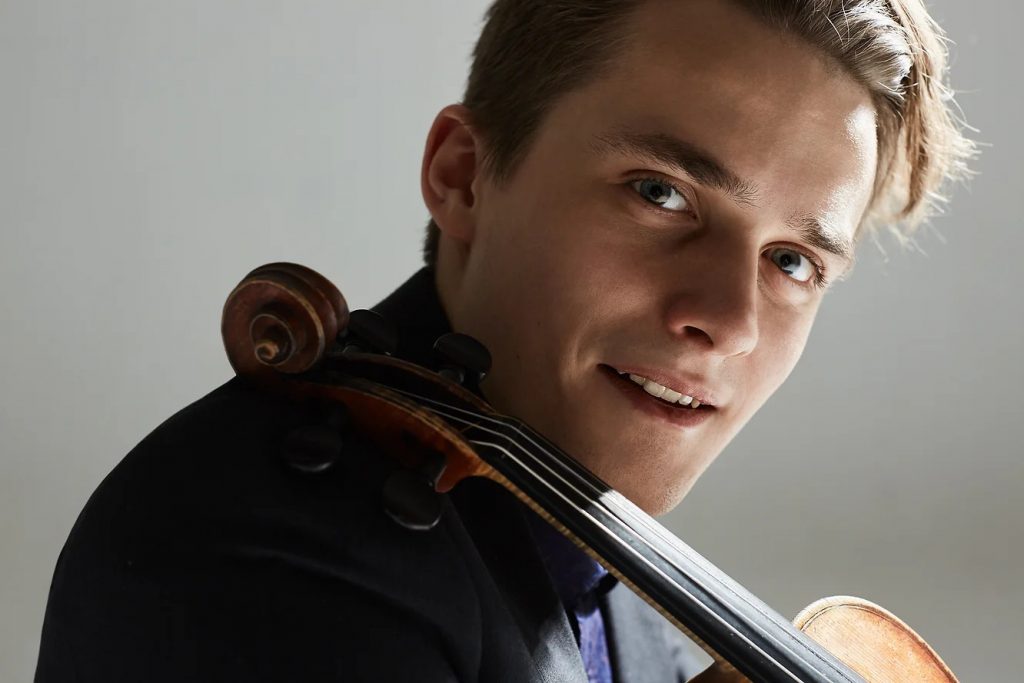
The residency during which Theresia was conducted by Giovanni Antonini came to an end with two extraordinary concerts. The two evenings were great success, where the orchestra received applause from a truly enthusiastic audience; two concerts in which Beethoven’s music sparked with energy, transparency, and expressiveness. This was also thanks to the extraordinary soloist who accompanied us on our Beethoven adventure, a first both for Theresia and 28-year-old Russian violinist Dmitry Smirnov.
In a break between the balance rehearsal and a concert, we had a long chat with Dmitry and we’d like you to get to know him a little better too. And we highly recommend to follow his brilliant career!
We started at the very beginning, when Dmitry Smirnov was only a small little boy who started to play the violin…
“I started to play the violin when I was five years old: it was thanks to my parents, who are both professional musicians, specifically singers. They took care of the first part of my education. I was obviously trained to play the modern violin since it is not so easy to approach the baroque instrument in Russia as a young pupil: I realised that in Italy many of my peers were given the opportunity to try the baroque violin at a very young age, probably because there’s a stronger tradition in historically informed performance here.”
At some point you did turn to the baroque violin: how did this come about?
“I had moved to Switzerland to study at the University of Basel, where I met a great musician: Rainer Schmidt, who was my violin and chamber music teacher. I learned a lot from him, although the work was always focused on the modern violin. But just at that time, when I was 20 years old, I attended a concert of Il Giardino Armonico in Basel: and it was there that I finally discovered a different way of playing, which affected me deeply.”
What struck you in particular?
“At that moment, the rhythm which had an energy all of its own, but also the simplicity of the act of performing. Then, over time, I realised that what struck me came from articulation, from intonation, from a number of things.”
And what did you do next?
“I kept on researching, listening, informing myself. Then, in 2017, I tried gut strings on my own instrument. It was amazing because I realised that by playing with gut strings and the baroque bow I was learning a great deal: it’s as if the gut strings taught me again about the articulation of sound, phrasing, things that I had learned, that were taught to me but somehow I had forgotten or kept at the back of my mind.”
Did you take lessons?
“Of course I did. Among other things, I was lucky enough to take a masterclass with Amandine Beyer: I played Bach, and she taught me so many things, with such an open mind. Like me, she comes from modern violin background too, but nowadays she’s a leading reference for those who want to play the baroque violin.”
So today, what relevance does the baroque violin have in your career?
“Well, it is not my primary activity, but I try to play the baroque violin as often as I can. And, I would love to end this separation between modern playing and historically informed playing, as you can apply HIP’s approach to any repertoire.”
When did you meet Maestro Giovanni Antonini and started working with him?
“This was in 2019: we had had some encounters in Zurich, where I had attended some performances of Il Giardino Armonico. I remember listening to Handel’s Alcina and Mozart’s Idomeneo. He probably had listened to some of my recordings, because he invited me to join Il Giardino Armonico for a recording of three of Haydn’s Symphonies.”
How was the experience of being conducted by Giovanni Antonini?
“It was great! Giovanni Antonini is at the heart of the orchestra, he lets something incredible happen: I found myself surrounded by wonderful instrumentalists, where everybody was humble and generous at the same time.”
Did you experience the same feeling with Theresia Orchestra?
“Sure I did. It’s an amazing ensemble, the musicians are so energetic. And I must acknowledge that the organisation was impeccable, they have a wonderful team of staff working behind the scenes.”
Speaking of ensembles, you founded your own a few years ago: what kind of ensemble is “Camerata Rhein” and what repertoire does it focus on?
“It is a variable chamber music ensemble based on a trio of clarinet, violin and piano: I must confess it was born as a sort of pet project, just to spend time reading new music and playing with friends, with the idea to let others join us (for example, inviting a cellist to perform Messiaen’s Quatour pour la fin du temps). Giving it a name was in the first place a way to justify the amount of time we spent together playing! But then we were lucky enough to be invited to many festivals in Switzerland, where our project was really well received.”
What do you do when you’re not playing? Do you have any hobbies or is music taking up hundred percent of your life?
“Music took most of my time when I was young especially due to bad time management: today, music is indeed my passion, and when your job coincides with your biggest passion in order to save yourself, you have to pull the brake sometimes and let it cook. I love to learn new things, like languages, but also spend more time with my family, and obviously with my wife, who I married one year ago. I also like to listen to a different kind of music than the one I play: I especially like Thom Yorke and Jonny Greenwood, two artists who by the way often work together, and I recently discovered Gregory Porter, a fantastic singer.”
With Theresia, you rehearsed in Ravenna, and performed in Rovereto and Florence: what did you enjoy most on this Italian tour?
“I would say the food, but that’s not very original, is it? Well, Ravenna and Rovereto are two places I didn’t know at all and I very much enjoyed visiting both cities. I noticed that Rovereto is very close to Lake Garda, which I love very much, but there was no time to get there as we only stayed there shortly. Luckily, we had more time in Ravenna: the mosaics are astonishing and as it often happens while in Italy, I enjoyed being surrounded by things that bring you into the history of the place.”


